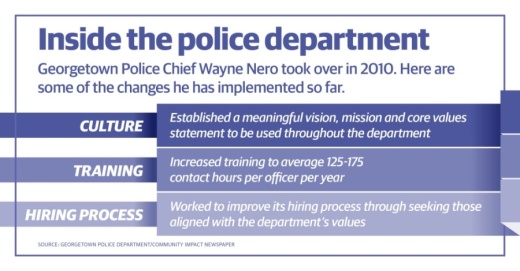Nero told Community Impact Newspaper in an email that since 2010, when he became police chief, GPD has had just five complaints of racially unjust policing, all of which were investigated and all of which were unfounded, he said.
“Our policies are very clear on the matter of racial based policing, and such actions would not be tolerated,” Nero said.
Nero said if such a complaint is submitted, it is captured into a complaint management system and thoroughly investigated by the officer’s chain of command or the GPD Professional Standards Division. He added that all matters regarding racially unjust policing are investigated and/or reviewed by the Professional Standards Division. If corrective action is warranted, it is handled at the appropriate level within the chain of command up to and including the office of the chief, he said.
Since becoming chief, Nero said he has also made policy changes he believes have collectively improved the department. Some of those changes include establishing a vision, a mission and a core values structure to build throughout the organization; rewriting the policy manual in accordance with law-enforcement best practices; increasing hours of training per officer and improving accountability through transparency, among others.
Nero said the department also takes seriously who they hire, based particularly on the department’s core values of integrity, leadership, teamwork, professionalism and accountability, according to the GPD website.
“Hiring is the most important thing we do,” Nero said.
Nero has also spoken about the death of George Floyd and what it means for the Georgetown community. He said in a June 3 Facebook post that while he condemns the officers in the case, he also condemns violence among protesters.
“Talking isn’t enough. Talk is cheap, as is criticism—they’re both easy to do and produce limited results. Of course, I condemn the actions of those officers. I don’t know one professional police officer who doesn’t. I condemn the rioting as well, as anger and hate isn’t the answer,” he said.
In the post, Nero also promised to gather a diverse group of local leaders to work to bring the community together rather than to “objectify one another by choosing sides and picking teams.”
“Stronger relationships create opportunity for meaningful change. When we are willing to truly see each other as people, hearts soften, minds open and change happens,” he added.
In Nero’s time as chief, he also created the CommUNITY Initiative, which he said is not new but is a working strategic framework for how GPD addresses community engagement.
Chuck Collins, executive director of Southeast Georgetown Community Council, said he has worked with the chief to improve policing via this initiative.
Collins, a black man, has been a resident of Georgetown for 20 years, and he said he has seen an improvement in how people of color are treated by the police since Nero took over.
“Just in my experience, I've seen a change in the way the officers that I've come in contact with [have] changed their attitude and the way they can handle things,” Collins said.
SGCC is a nonprofit that helps people of color in Georgetown—particularly those in Southeast Georgetown—and builds a bridge between the community and local government, Collins said. It also works to help residents establish ideas that can benefit the community, he added.
Even in providing a voice, however, Collins said it is not always easy to amplify it.
“I'm not saying these city officials aren't listening to people or anything like that; what I'm saying is—at least, down at my level—the impression is that [people of color] are not being listened to,” Collins said. “That’s a bad problem.”
Collins said he is encouraged by those speaking out and soul-searching across the nation.
“I’m not condoning any violence or anything, but speak up, and let ... city leaders know what you want,” Collins said.





